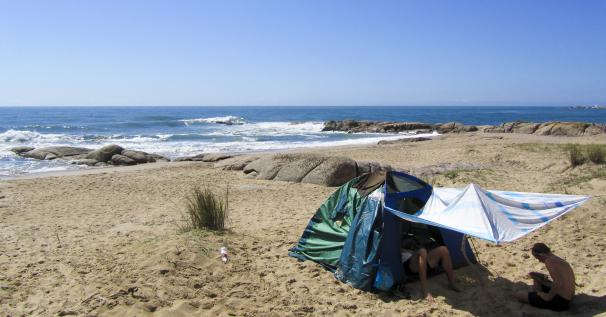
No available rooms posed a problem in Uruguay. We did just fine.
on August 21, 2012
When people ask me for advice on their upcoming trip, my first suggestion (after directing them to pack light) is to stop planning! Over-planning is a mistake that’s very common, partly because organizing makes people feel more secure. Embracing spontaneity can be scary, but having flexibility in your plans is crucial. I'm so convinced of this, that nowadays, I tend to freestyle and figure things out as I’m going.
Flexibility
With looser plans, you can learn and adjust course while your trip is in progress, spending more time in places you appreciate or even changing course entirely on a whim. Flexibility keeps you from feeling trapped if the pace of your trip starts to feel too fast or too slow.
Save money
Being ultra-flexible can also save a ton of money. If you don’t need to be somewhere specific, one option is to find the cheapest plane, train, or bus to a brand new place. It’s pretty thrilling to hop on a plane to a city you’ve never been to with no real plan in order for your arrival.
Pitfalls of inflexibility
Travel companies often entice customers with itineraries that stretch to fit many cities into a ‘standard length’ vacation, inflating the perceived value of the trip. Whirlwind tours of this type often leave people disappointed. There is no time to genuinely experience any of the destinations beyond a cursory glance. Short cruises make this especially apparent with only a few hours on land in the various ports of call. If you have too many things on your list of must-dos, you’ll be on the go so frequently that there simply won’t be time to catch your breath.
Full itineraries don’t equal full experiences
It’s easy to get caught up in the go-go-go, making connection after connection to stay on schedule. The best reason to slow down is to see and feel your surroundings. Don’t miss the chance to actually experience the culture, flavor, and feeling of the places you visit. Having too many travel-related goals prevents you from living in the moment and experiencing your adventure as it’s happening.
Remember why you are traveling
Is it really important to see every museum in ten cities in two weeks? For the most part, the great memories are great because of the people you shared them with, not because of the stuff you saw. This is still true when traveling solo, since you’ll always manage to find friends-for-a-day or have interesting experiences with the locals.
Pay attention to people telling stories about their trips in the past. You’ll notice that the short version might include the name of a headliner tourist destination, but the best memory usually has a different flavor. Peoples’ favorite traveling stories are about interesting humans they met or unexpected experiences along the way. Traveling with fewer plans is the easiest way to invite these people and situations into your life.
Easy does it
If it’s your first big trip, ease into this! Winging it can be stressful, too, especially if you’re not that experienced. If the idea of no plans is frightening, you can always start by having a few entirely unplanned days in your otherwise fully outlined trip.
If you’re not used to it, being free of plans can actually take practice. Try sitting in the park, attempting to chat with locals in the café, or walking the streets to see what you find. These are often better ways to experience a given place than another day whisking around town to all the tourist spots. Avoiding business (as in busy) gives you more chance to think about what you’re seeing, hearing, smelling, and feeling. A little meditation goes a long ways.
In my next post I’ll explain how traveling without a plan doesn’t mean traveling completely unprepared.

